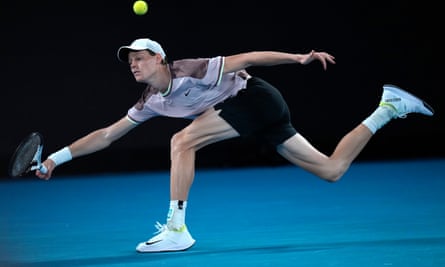Hurtling through another one-sided decider, the world of tennis held its breath. Much was riding on the first Australian Open final since 2005 without one of the so-called “big three”. A sign of things to come, in a sport wrestling with change. But with Daniil Medvedev having his way with the emerging Italian Jannik Sinner, a simple contest – even a skerrick of competition – was all anyone wanted.
Another early night beckoned. It was a shame, given the ingredients were there for a spectacle worthy of Hollywood. There was the imperious Russian. The Bond girl watching on. A glistening sunset, an eternal summer eve. A boy of promise, a likeable if ungainly hero. Perhaps more Ron than Harry, but who’s complaining.
And Melbourne Park was buzzing, 15,000 were seated inside Rod Laver Arena, including the supermodel Elle Macpherson. There were Australian celebrities such as Simon Baker and Eric Bana. The country’s sporting, business and political elite, and the Cuban actor Ana de Armas. There to help promote the “official trophy trunk partner”, a big brown box. Those who had to pay their own way, forking out hundreds if not thousands of dollars under controversial dynamic pricing that increases with demand. But with higher pricing comes higher expectations.
An hour in and Sinner was mostly lifeless, one set down. His first grand slam final, flashing before his eyes. Two more breaks in the second set followed. The match was becoming borderline embarrassing.
In the precinct outside Rod Laver Arena were twice as many as those who had seats. There were three separate live sites with towering screens. Unfolding in front of them were families on lawns, posers with flutes, and grey nomads wearing Evonne Goolagong T-shirts. Then there were the riff-raff spilling out of the 9,000-person music festival at the adjacent John Cain Arena. Finishing half an hour before Sinner and Medvedev took to centre court, DJs Groove Armada whipped up the throng, drenching the surface of the so-called “people’s court” with another layer of sweat.
These sights, these sounds, these smells, filling Melbourne Park on this balmy eve: the vision of the new Australian Open began to make sense. The best of world tennis as the anchor for a music, fashion, culinary and commercial extravaganza. One million spectators have come through the gates at the precinct, just a walk away from downtown Melbourne. A record, they kept telling us.

But icing needs a cake. After the women’s singles final lasted barely an hour, organisers and broadcasters would have hoped the men’s showpiece delivered. After the headline magnet Novak Djokovic was eliminated by Sinner in the semi-finals. After Rafael Nadal succumbed to another injury before the tournament even began. And as the tennis calendar is prodded and pulled by new investment and influence.
Even as Sinner started to mount a revival, late in the second set, this looked more fizzer than Federer. The 22-year-old, on his back foot, kept diving into his bag. But more often than not he pulled out a half-hearted drop-shot, with uneven success. The inference was clear. He was struggling for answers against an in-form opponent. The man they call “The Octopus”, all tentacles shooting across the court, his volleys hit with touch not unlike a suction cup. On the sea of blue on the courts of Melbourne Park, Medvedev was in his element.
after newsletter promotion
He had, after all, more experience than anyone. The Russian had already endured three five-set encounters on these blue surfaces. But this comfort would prove to be his downfall. As the Italian shed his nerves and found his forehand, the minutes ate away at Medvedev. By the end he had spent more time on court than any player at any previous grand slam.
And so from three sets, to three acts. The match, a fully fledged feature. Like a good blockbuster, it was clear where the plot was going, but it was hard to look away. Sinner surged, winning the key points at the end of the third. A timeout for Medvedev, another break for retaping. “He’s tired, keep working him,” Sinner’s coach, Darren Cahill, shouted. A valiant effort late by the clearly exhausted Russian, but by then the script had been signed off.
This was the arrival of a new tennis superstar, in the most dramatic way possible. All copper fringe and awkward hands, but an extraordinary tennis talent. A worthy peer of Carlos Alcaraz. The faces of a fresh generation, stewarding men’s tennis into a new phase.
A simple plot, with a compelling arc. A bow tied on a tournament rich with narrative. “That’s it, I don’t know any more what to say,” Sinner offered, to conclude the trophy presentation. For tennis, he had done enough. He didn’t need to say another thing.
